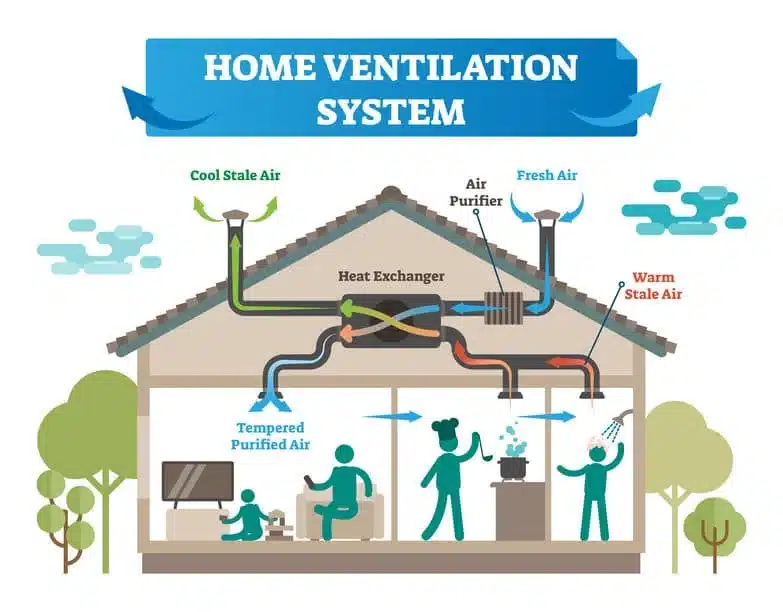Ventilation is the exchange of air from one place to another. In your home, this means bringing in outside air and letting out the inside air. A healthy home needs to breathe, just as humans do.
For centuries homes were not ventilated. Houses 100 years ago were very leaky. They typically did not have insulation in the walls, so fresh air easily entered through gaps, cracks, and holes in the building envelope. Today, however, with all the insulation homes are now equipped with, ventilation is much more important to keep our indoor air healthy.
The advantages of having proper ventilation are many. They include reducing air pollutants, such as formaldehyde from new carpets and radon gases. Ventilation also decreases the amount of moisture in the air. Too much moisture can lead to mold and even rotting wood. Adequate home ventilation also limits odors from pets, cooking, smoking, and other daily activities.
Poor indoor air quality can also bring about condensation on your window, wood warping, and peeling or chipping paint. This is especially unhealthy for people who suffer from allergies.

Recommendations for Adding More Ventilation into Your Home
Use Spot Ventilation: Install exhaust fans in your bathroom and kitchen to eliminate moisture and odors. You want to avoid dangerous carbon monoxide poisoning by ensuring that fireplaces or wood stoves are properly vented. Be sure to have clothes dryers and whole house vacuums vent directly outside.
Keep Your Filters Clean: Your HVAC system circulates air throughout your entire home. If you have a dirty filter, your HVAC system is not as effective at cleaning the indoor air, and it works much harder, leading to higher energy costs.
Insulate and Ventilate Your Attic: Heat and condensation usually accumulate in your attic, causing mold and impacting structural integrity. What can prevent these issues is having whole-house fans, soffit vents, and eaves vents.
Install a Ventilation System: Having your home audited by a field service technician at Apollo Heating and Air Conditioning will help you decide on the best ventilation system for your home. Older homes are typically less airtight, which translates into the possible leaking of air unpredictably and uncontrollably. Newer homes are constructed to be more energy-efficient. Ironically, newer homes might be too tight, leading to unhealthy indoor air. A professional from Apollo Heating and Air Conditioning can assess your needs and your home’s condition, and suggest an efficient and effective solution.
Balanced Ventilation: Better ventilation is provided through a balanced system in which separate fans drive both inlet and exhaust airflow. This enables you to control where the fresh air originates from, where the fresh air is delivered, and where exhaust air is drawn. Balanced ventilation systems can be either point-source or ducted. Ducted systems are ideal for delivering fresh air to spaces that are most lived in, such as the living room, bedrooms, etc., and exhaust indoor air from places where moisture or contaminants are produced, like the bathrooms, kitchen or a hobby room.
Balanced Ventilation with Heat Recovery: If you have separate fans to bring in the fresh air and exhaust indoor air, it is recommended to place these fans together and include an air-to-air heat exchanger so the outgoing house air will precondition the incoming outdoor air. This air-to-air heat exchanger – commonly referred to as a heat-recovery ventilator or HRV – is ideally suited for colder climates. A different version, known as an energy-recovery ventilator (ERV), transfers moisture, as well as heat, from one airstream to the other. This process retains more of the desirable humidity in the house during the winter and reduces the amount of humidity brought in from the outdoors in the summer.
Clean the Air: A majority of heating and cooling systems do not totally eliminate moisture in the air. That is why it is recommended to use a whole-home or single-room dehumidifier to minimize mold potential. Change your air filter at least four times a year – more frequently if your home has air quality issues. It’s also suggested you clean your carpets with a HEPA-filtered vacuum regularly.
Look to Apollo Heating and Air Conditioning to Improve Your Indoor Air Quality!
Apollo’s In-Duct LED Air Purifier is a whole-home air purification system that reduces airborne and surface contaminants, viruses, and pollutants, all through bi-polar ionization.
Apollo also offers the Carrier Infinity® Air Purifier that makes the air in your home much cleaner.
Ensure your home air quality is the best it can be with HVAC innovation from Apollo.
Learn more by contacting Apollo Heating and Air Conditioning! Call us at (509) 396-COLD (2653).



